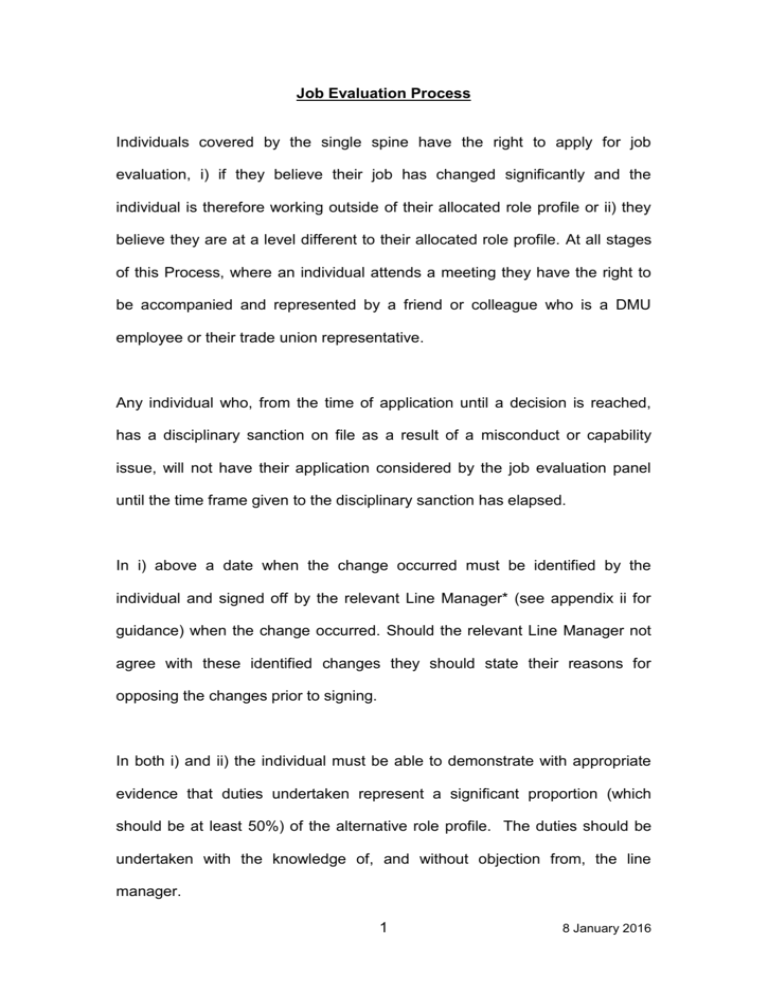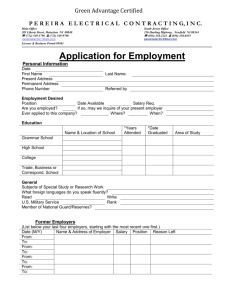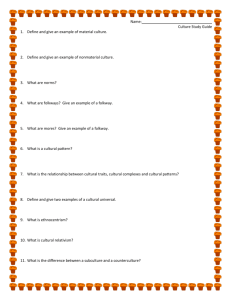Job Evaluation process
advertisement

Job Evaluation Process Individuals covered by the single spine have the right to apply for job evaluation, i) if they believe their job has changed significantly and the individual is therefore working outside of their allocated role profile or ii) they believe they are at a level different to their allocated role profile. At all stages of this Process, where an individual attends a meeting they have the right to be accompanied and represented by a friend or colleague who is a DMU employee or their trade union representative. Any individual who, from the time of application until a decision is reached, has a disciplinary sanction on file as a result of a misconduct or capability issue, will not have their application considered by the job evaluation panel until the time frame given to the disciplinary sanction has elapsed. In i) above a date when the change occurred must be identified by the individual and signed off by the relevant Line Manager* (see appendix ii for guidance) when the change occurred. Should the relevant Line Manager not agree with these identified changes they should state their reasons for opposing the changes prior to signing. In both i) and ii) the individual must be able to demonstrate with appropriate evidence that duties undertaken represent a significant proportion (which should be at least 50%) of the alternative role profile. The duties should be undertaken with the knowledge of, and without objection from, the line manager. 1 8 January 2016 Where disagreements occur, a meeting between the individual and relevant Line Manager will take place. This will be facilitated by an HR Adviser. It is important to note that there are a number of possible outcomes as a result of job evaluation, namely: a) A new role profile may be identified which may result in an increase to an individual’s grade. b) A new role profile may be identified which may result in a down grading. c) An alternative role profile may be identified and the individual’s grade remains the same. d) No change to the grade or role profile is made. Job evaluation is potentially a two stage process. Stage I Where it is demonstrated that there is a significant difference in the role the individual carries out compared to the role profile allocated then the relevant Line Manager* (see Appendix ii for guidance) and HRA will, through an agreed ‘matching process’ identify the most appropriate alternative role profile to match the identified job outputs. Where a match can be determined, which is evidenced based, and the individual agrees it is appropriate, then the 2 8 January 2016 individual will receive confirmation of their application and their new role allocation. In all other cases1, a meeting will take place between the applicant, the Line Manager and the HR Adviser with the aim of reaching agreement before a decision is reached at Stage 1. Matching process meetings can take place at any time of the year. The individual will normally have been conducting these duties for at least 3 months before a matching process meeting can take place. Any salary increase resulting from job evaluation is a permanent increase for as long as the employee remains in post or until the post changes. Normally when duties have been performed for at least 3 months they are intended to be indefinite, but in exceptional circumstances the Line Manager and HR Adviser may decide an alternative process for recognition is more appropriate. Where there is a resultant change in grade, any salary increasing a grade will move to the bottom spinal point of the grade of the new role profile, and the salary change will be backdated to the date of the application. If the current salary is higher than the bottom point of the new grade (for example because of contribution points or because the salary is protected), then the salary will move to the lowest salary point which is equal to the current salary. Incremental increases will be in line with existing arrangements. 1 this is intended to apply when either: 1) the Line Mgr and HRA think the individual is already appropriately graded, OR 2) they think the grade is wrong, but cannot determine a new role profile, OR 3) they think the grade is wrong, but the applicant does not agree with the suggested role profile 3 8 January 2016 Where the new grade is lower than the current grade, the individual will continue at their current pay level, on a protected basis, for a period of 18 months, unless the need for protection disappears (for example, if the individual is appointed to a new role, which can be at any grade). During this period of pay protection for red circled staff, they will not be entitled to any increments, but the annual pay awards will continue to apply to the protected salary. After this 18 month period, the individual’s pay will be reduced to the highest point below the contribution threshold on the pay range appropriate for the post as graded following job evaluation. The line manager will also consider, when appropriate, whether there is a business case for: Expanding the applicant’s role such that the grade of the post may increase. Providing training opportunities that will enhance the applicant’s chances of moving to a post at a higher grade, should one become available. The normal recruitment procedures will apply. If through discussion the relevant Line Manager and the HRA agree that the individual is matched to an inappropriate role profile but is correctly graded, through discussion with the individual an alternative role profile will be identified at the same grade and the individual’s salary will remain unchanged. Incremental increases will be in line with existing arrangements. If the individual remains dissatisfied then they will be given the opportunity to appeal by progressing to Stage II. 4 8 January 2016 This will be the end of stage I process. Stage II Where agreement cannot be reached at Stage I the individual will be given the opportunity to progress to Stage II. Stage II will involve collection of evidence by a role analyst using the processes outlined through HERA Role Analysis. Once evidence has been collated and agreed by both the individual and relevant Line Manager it will be considered by the next available JE panel. In the event that the line manager and individual cannot agree on the content of the written record, a meeting will be arranged between the HRA, line manager, applicant and, if they wish, a trade union representative, in order to reach a resolution. If no resolution is achieved, the individual has the right to use an appropriate University procedure, for example the Grievance Procedure. A Job Evaluation panel will meet annually, normally in February or March of each year, to consider applications for job evaluation. The decision of the panel is final. All salary changes will follow the same procedure as identified in Stage I above. Any resultant changes to an individual’s grade will be as above. 5 8 January 2016 Once an individual has applied for Job Evaluation, another application cannot be made for two years from the decision date, unless there have been changes of role or new evidence since the initial application was made. The outcomes of the JE Panel will be made available to the University Pay Progression Panels to allow statistical information to be analysed in respect of impact assessments. These analyses will be made available to the academic JNC and professional services staff JCNC. 6 8 January 2016 Appendix i Employees Exempt from the Job Evaluation Process Any individual who, from the time of application until a decision is reached, has a disciplinary sanction on file as a result of a misconduct or capability issue, will not have their application considered by the panel until the time frame given to the disciplinary sanction has elapsed. What is a Disciplinary Sanction? If you have a disciplinary sanction on file, it will be the result of a disciplinary hearing. When the sanction was issued you will have been informed how long the sanction would stay on your personal record for. If I have a disciplinary sanction on file, will I be eligible to apply for Job Evaluation? Yes, but your application will only be considered when the time frame given to your disciplinary sanction has elapsed. 7 8 January 2016 Appendix ii The Relevant Manager The meaning of relevant manager in the Job Evaluation process refers to the following: For Academic Staff The relevant manager will be the Head of School / Department. For Professional Services Staff The relevant manager will be: Faculties – The Faculty Manager/Technical Manager Directorates – The Appropriate Senior Manager (To be determined by the Dean/Director in conjunction with HR) Please note where the individual’s immediate Line Manager is not responsible for signing off the role changes and making a decision, the relevant manager (see above) should ensure they have consulted with the immediate Line Manager , so all parties are aware of the process. The PVC/Dean or Director is required to sign the application initially, upon receipt, to acknowledge that it has been made and to confirm that it is an accurate record of the individual’s role. They are then required to sign again once the stage 1 meeting has taken place to endorse the decision made at stage 1 and approve any salary increase (for further details please refer to ‘Guidelines for PVC/Deans/Directors’). They must also sign the written records produced at stage 2 of the process to confirm again that the duties are an accurate record of the individual’s role. 8 8 January 2016 Appendix iii Composition of the Job Evaluation Panels Academic Panels Chair – (normally the University’s External Pay and Grading Expert) 2 UCU Representatives 2 Academic Management Representatives 2 HR Representatives 1 UNISON Representative Support Panels Chair – (normally the University’s External Pay and Grading Expert) 2 UNISON Representatives 2 Support Management Representatives 2 HR Representatives 1 UCU Representative 9 8 January 2016







